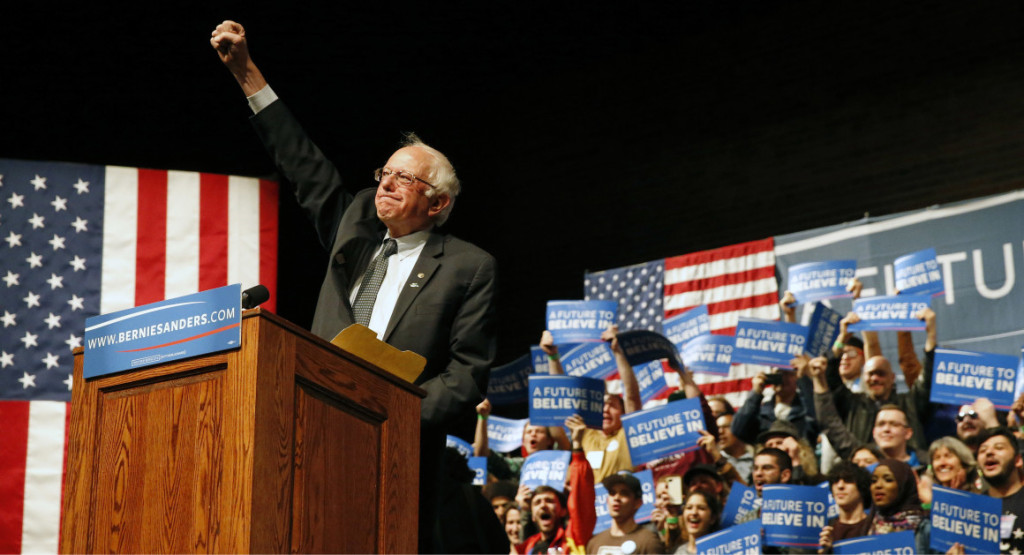APRIL 6, 2016
Photo: AP
If the results of last night’s primaries in Wisconsin have taught us one thing, it’s that the nominating contests in both parties are far from over.
Tuesday night was a night for underdogs as Ted Cruz and Bernie Sanders celebrated resounding victories against the front-runners in their respective parties. In the Republican contest, Cruz defeated Donald Trump by double digits, and Sanders did the same to Hillary Clinton in the Democratic primary. But did their victories fundamentally shake up the race?
In the case of the Democrats, not really. Unlike the GOP, which conducts a number of winner-take-all primaries, the Democrats award primary delegates proportionally. Last night, Sanders was awarded 10 more delegates than Clinton (48-38), and while the win will certainly increase donations and continue the momentum of the Sanders campaign — this is his impressive 7th victory in the last 8 states — the victory will barely put a dent in the Clinton delegate lead. (This is no knock on Bernie’s string of victories, but at this point, it’s all about math.)
The GOP primary result, on the other hand, may have lasting implications for the rest of the campaign. Had Trump overwhelmingly won Wisconsin, as he recently had been favored to do as recently as just a few weeks ago, he would have had a numerical path to reach the 1,237 delegates needed to win the nomination on the first ballot. But that was before Trump said that women who have illegal abortions should be “punished” and that he had no intention of taking a plan to nuke Europe off the table. (!!!!) When this is over and if Trump is not the eventual nominee, he is likely to look back on this week as the place he lost it.
With Cruz taking 30 more delegates in Wisconsin than Trump, even the rosiest numbers-cruncher will now have to admit that Trump will fall short of 1,237. At that point, all will depend on how short Trump is. If he’s less than 50 delegates shy of the magic number, the author of “The Art of the Deal” will certainly find a way to cajole enough unbound delegates to put him over the top. But if Trump is more than 100 delegates behind and loses on the first ballot, he’s probably cooked. Then it would be up to Cruz to win over Trump supporters on the second ballot. If Trump and Cruz both fall short, then all hell will break loose on the third ballot, and we will have the greatest television show of all time. See you in Cleveland!
REPUBLICANS
TED CRUZ (48% of the vote, 36 pledged delegates) — Wisconsin was a must-win for Cruz, and with the help of the #NeverTrump coalition of local conservative talk show hosts, Cruz did the job and then some. But the next couple of weeks are going to be rough for him as the primary calendar turns to New York and other Eastern Trump strongholds. The best that Cruz could hope for is that Trump implodes again in another interview with Chris Matthews.
DONALD TRUMP (35% of the vote, 6 pledged delegates) –– In addition to all of his boner remarks over the last few weeks, Trump made the mistake of attacking Wisconsin Governor Scott Walker, a former campaign rival who has an 80% approval rate among Republicans in the state. Trump’s campaign is in a downward spiral, and he needs to pull out of it now to repair the damage he caused in the past two weeks.
JOHN KASICH (14% of the vote, zero pledged delegates) — If he has the money to spend, there’s no real reason why Kasich should get out if we wants to tie up delegates to keep Trump from getting to 1,237. And he’s actually running second (ahead of Cruz) in delegate-rich New York and Pennsylvania. But he’s going to have to start winning something soon to sustain any credibility he has left as a candidate.
DEMOCRATS
BERNIE SANDERS (57% of the vote, 48 pledged delegates) — Sanders has been on a tear the past few weeks, and the victory in Wisconsin was probably his most impressive yet. But not only does he need to keep winning, he needs to keep winning big (like 65% of the vote big) to have any chance of gaining substantially on Clinton’s lead, and the big states coming up (New York and Pennsylvania in particular) with their widely diverse demographics could be a heavy lift for Sanders. But he does have the momentum.
HILLARY CLINTON (43% of the vote, 38 pledged delegates) — Clinton seemed resigned to losing Wisconsin, as she spent election day campaigning far away in New York. Sanders is proving to be a very stubborn opponent, which would normally call for the candidate to go on the attack. But Clinton in attack mode can be very unappealing, so she’s going to need to find a new way to score some points, because New York is a state that she can’t afford to lose.
For you fans of the horse-race, here’s where everybody stands, delegate-wise:
THE DELEGATE COUNT
REPUBLICANS (1,237 needed to win)
Donald Trump 750 (plus 6 pledged delegates won last night) = 756
Ted Cruz 481 (plus 36 pledged delegates won last night ) = 517
The Ghost of Marco Rubio = 172
John Kasich 143 (plus zero pledged delegates won last night) = 143
DEMOCRATS (2,383 needed to win)
Hillary Clinton 1,692 (plus 38 pledged delegates won last night) = 1,730
Bernie Sanders 1,012 (plus 48 pledged delegates won last night) = 1,060
The next big event is the New York primary on April 19. This one’s going to be down and dirty, so get the popcorn ready. And don’t forget to be there or be square!












